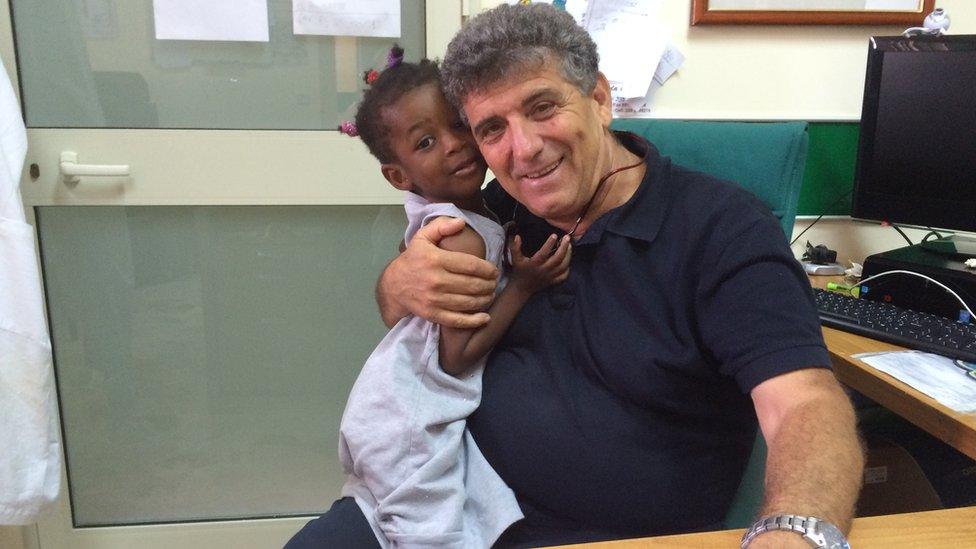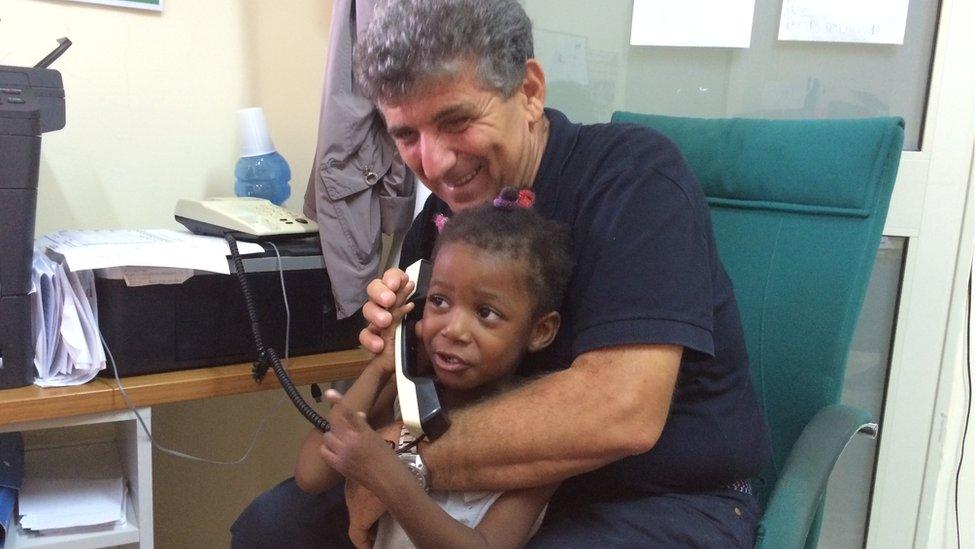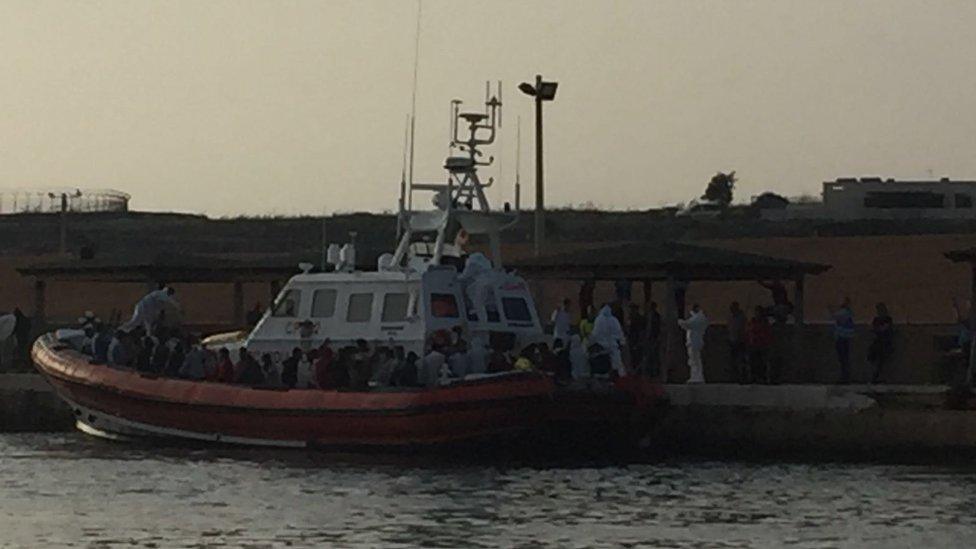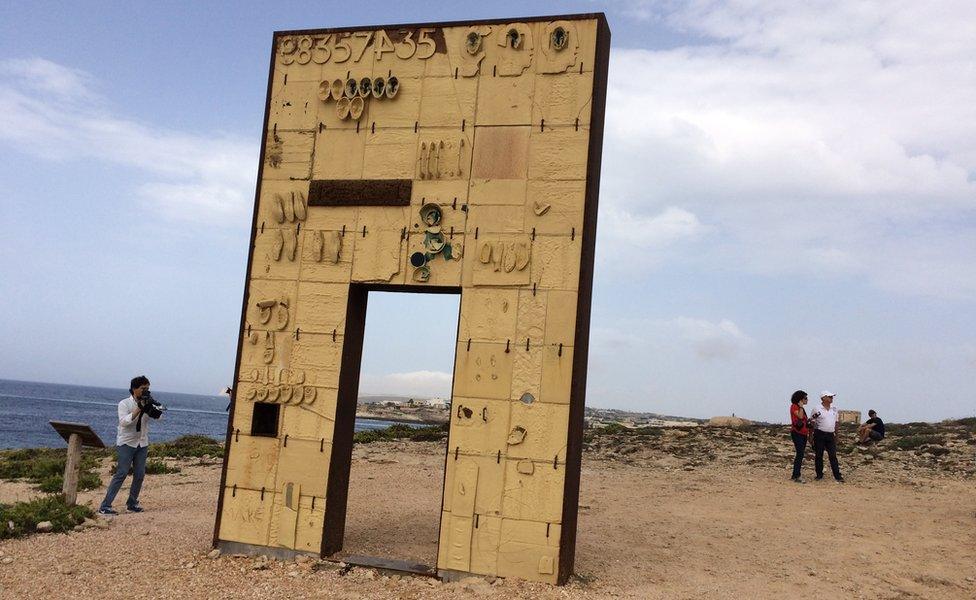The doctor who has met 250,000 migrants
- Published

Every week, hundreds of people seeking asylum in Europe arrive on the Italian island of Lampedusa, many of them sick or injured. The island's chief doctor never misses a single landing - and it's having a huge impact on his own well-being.
She's been on European soil for less than two hours, but the capricious little four-year-old from Mali - Lampedusa's newest arrival - has already picked up two vital words of Italian: "Ciao," which she cheerfully chirrups at every hospital patient and porter who passes, and "Pietro", which she shouts joyfully and excitedly the way all children do when they see their real-life hero - be he Mickey Mouse or Father Christmas.
Feverish and popping paracetamol pills as he hunches over a mound of case notes on his desk, Dr Pietro Bartolo, 60, doesn't look too heroic this morning.
With his sore throat and visible aches and shivers, the best place for Dr Pietro today would undoubtedly be his bed, but overnight there were three boatloads of new migrant arrivals and some of them need urgent medical care.
His office door bangs open and the little Malian girl hurls herself through it and leaps onto his lap, her arms locked around his neck, her cheek against his. She looks over at me proudly. Her Pietro. The Disneyland doctor who met her off that terrible boat with a fluffy white teddy, a chocolate biscuit and a fizzy drink.
Dr Pietro roars with delight as she picks up his phone and jotter and starts playing secretary. Her mother, he tells me, is in a wheelchair, but she told him they'd braved the journey to find an aunt who's already settled in Europe.

He'd asked her gently where auntie was living - Italy, Germany, Holland, France? The mother had shaken her head in confusion. No, Europe, she'd said. Auntie lives in Europe.
Dr Pietro reminds me that EU laws require that the mother is finger-printed and registered here in Italy. She'll never get to her intended destination, will she, he asks. I realise this is not a rhetorical question. He wants me to reassure him. He needs comfort.
When the little girl has been sent off to get some shoes, I ask Dr Pietro whether it ever gets easier. He's bewildered.
"How can it?", he replies. "How can you get used to seeing people suffering? You saw that little child just now…"
He tells me mostly about the children he sees with agonising chemical and petrol burns - the dinghy disease, he calls it bitterly. But it's the women who suffer the most, he says. They practically all arrive raped, even the little girls of 12 and 13 - the psychological trauma is so big that… he breaks off and rests his head on the desk for a moment.

The Malian girl was rescued from this coastguard's boat
"They all used to arrive pregnant," he continues in a controlled, professional tone. "But no longer - not because they haven't been raped but because, they tell me, the traffickers are giving them injections to stop their ovulation. We've no idea what dose of drugs they've been given."
Dr Pietro remains a staunch Catholic - there's a photograph of him on his office wall proudly meeting the Pope - but he's struggling to keep his faith in humanity.
"This is man's monstrosity, man's atrocity. We've created this!", he says. He bangs the desk with his fist suddenly and a yellow plastic toy by his phone quivers on its spring.
"I know it's difficult to stop wars, to relocate migrants, to integrate them," he tells me. "But the priority has to be to save lives and to stop all this drowning at sea. The talking can come later."

Lampedusa, which lies about 110km (70 miles) off Tunisia, is regarded by those travelling from Africa as a gateway to Europe
I wait until the little toy has stilled itself before I ask him my next question. Because I know why Dr Pietro is so passionate about saving lives - Lampedusa is a small place and Dr Pietro isn't just needed to treat the survivors. He also has to unzip the body bags.
"No one can get used to seeing the dead," he declares. He speaks flatly and methodically about the process of autopsy, searching for identifying tattoos, dental work or distinguishing marks. Of course, when the corpses are decomposed and it's no longer possible to fingerprint or photograph them, the forensic police, he explains, ask for a tissue sample for the DNA database. That means - he says - that means… He puts his hands together as if in prayer, as if asking for forgiveness.
"I have to cut off a finger or an ear, cut out a rib," he says quietly. "It's so brutal."
A quarter of a million migrant encounters over 20 years have not hardened Dr Pietro. He's fighting tears now.
"I'm not a robot," he reminds me. "I'm just a man with ordinary feelings and emotions."
In the corridor, a little sing-song voice is calling: "Pietro! Pietro!" and I watch the doctor of Lampedusa hurriedly recompose himself to become once again the magical doctor of Disneyland.
Join the conversation - find us on Facebook, external, Instagram, external, Snapchat , externaland Twitter, external